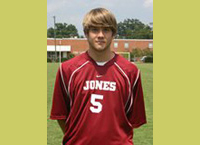

 Liver Recipient Sponsor: Astellas Pharma US, Inc. |
|
|
When 16-year-old Kurt Wiltcher returned home from volunteering at a Christian camp where he had been dirt boarding and rock climbing, he noticed that his eyes were turning yellow. After numerous appointments with different doctors, Kurt and his family were told that he needed a liver transplant and that he wasnít leaving the hospital without it. Kurt kept high spirits throughout his transplant surgery and recovery process. Now as a lifeguard and swim instructor at the YMCA he shares his transplant experience with the students. Kurt also helped create a kids transplant support group and is the editor of their bi-annual newsletter.
Kurt's Story The summer I turned sixteen was certainly unusual. I had returned from volunteering at a Christian camp where Iíd been dirt boarding and rock wall climbing when my eyes began turning yellow. Monday morning, I was at the office of a doctor Iíd never met - without an appointment. Within minutes I was having tests run and answering a thousand questions. I wanted them to give me some medicine to satisfy my parents and let me go back to my normal activities of life-guarding and playing baseball, which didnít happen. Within a two week period, I was transferred to another doctor, hospitalized, transferred to another hospital and another doctor. Iíll never forget when the surgeon told my family that I needed a liver transplant and that I wasnít leaving the hospital without it. He seemed surprised to learn that I had finished my sophomore year with perfect attendance and that Iíd been on the varsity swim team, soccer and baseball team. He said that Iíd been sick for years but I had not slowed down enough to notice. Thatís how I intended to keep it! My hospital stay never dampened my spirits. I spent months playing games with younger patients, learning to juggle, and making balloon animals. After my transplant and recovery, I said goodbye and quickly resumed my normal activities. Nine weeks after my surgery, I returned to school and swam in the last meet of the season, just missing the state qualifying time. The looks that I got made me realize that I had a great avenue to telling my story. Throughout high school, I continued to play sports. I tried out for and made the junior college soccer team. The coach didnít realize that Iíd had a transplant until a preseason shirts and skins scrimmage game; I was on skins. Then I told everyone about my transplant. My work as a lifeguard/swim instructor at the YMCA has been a great opportunity to share my experience. Each year, over 1,000 students participate in a swimming program. With each new group, I canít wait for kids to ask, ďWhat happened to you?Ē so I can tell my story. I helped create a kids transplant group and edit the newsletter that is published twice yearly. My idea of a portable ten-hole goofy golf course, that has information and pictures displayed by each hole, has been set up at events throughout the state. The people who play want to become organ donors. I also speak to church, school and civic groups. If I could turn back time, I wouldnít change anything. My transplant has been the most positive event in my life. Not only has it made me stronger and more energetic, it has allowed me to meet some of the most fascinating people. It has helped me realize that each day is a gift. Maybe through it, I can make a difference in the life of someone else. |
